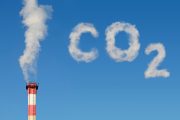
If the current enviro-doomsayer predictions frighten you, don’t worry. Just wait a bit.
They’ll change.
The kicker is that “predictions” about the past will change, too. A case in point is a recent Washington Post admission that all the “fossil fuels” we’ve been burning have had a global-warming-neutralizing cooling effect. And if this frightens you because you fear for your AGW agenda, don’t worry. Just wait a bit.
This cooling effect will soon cease and the warming will spike upwards. Thus spake the “experts,” anyway.
WaPo reports on the story:
It is widely accepted that humans have been heating up the planet for over a century by burning coal, oil and gas. Earth has already warmed by almost 1.2 degrees Celsius (2.2 degrees Fahrenheit) since preindustrial times, and the planet is poised to race past the hoped-for limit of 1.5 degrees Celsius of warming.
But fewer people know that burning fossil fuels doesn’t just cause global warming — it also causes global cooling. It is one of the great ironies of climate change that air pollution, which has killed tens of millions, has also curbed some of the worst effects of a warming planet.
Tiny particles from the combustion of coal, oil and gas can reflect sunlight and spur the formation of clouds, shading the planet from the sun’s rays. Since the 1980s, those particles have offset between 40 and 80 percent of the warming caused by greenhouse gases.
And now, as society cleans up pollution, that cooling effect is waning. New regulations have cut the amount of sulfur aerosols from global shipping traffic across the oceans; China, fighting its own air pollution problem, has slashed sulfur pollution dramatically in the last decade.
The result is even warmer temperatures — but exactly how much warmer is still under debate. The answer will have lasting impacts on humanity’s ability to meet its climate goals.
WaPo went on to cite a climate “expert” who conceded that they were beginning from a point of “deep, deep uncertainty” and that it’s possible a whole degree of temperature change is being “masked.”
Then again, it’s possible that the climate cultists “simply make things up as they go along to fit the narrative,” as commentator Jack Hellner put it last week. This raises a question, too:
Should we completely rejigger the world economy, upending lives and increasing poverty, based on the prognostications of those offering “deep, deep uncertainty”?
There are other questions to be pondered as well. Hellner poses seven, writing:
1) How can anyone calculate an accurate global temperature when they don’t put 70% of the weather stations over water, when 70% of the earth is covered by water?
2) How did they accurately calculate the average global temperature at the end of the pre-industrial period when there weren’t any weather stations? Incidentally, the industrial age began around 1760, which happened to be during a little ice age, which lasted from around 1300 to 1850.
3) Wouldn’t it be normal for some warming to occur after a little ice age ended?
4) Why don’t we ever see a calculation of how much of the estimated 2.2 degree temperature rise over the last 260 years occurred naturally, instead of supposedly caused by us? Isn’t that important?
5) Where is the data that shows a temperature rise of 2.2 degrees is correlated with the exponential rise in the use of oil, natural gas, coal, and all the other things that supposedly cause warming?
6) How did we have a global cooling period from 1940–1975 if all the things we are told caused warming actually did? Incidentally, the warmest day on record in the U.S. was almost exactly 111 years ago, when temperatures reached 134.4°F (56.7°C) in Death Valley, California, on July 10, 1913.
7) How did the people quoted in this article possibly calculate that 40% to 80% “offset”? The answer is that they couldn’t possibly know. Just like average global temperatures, the number is clearly made up, to support the radical agenda to destroy industries that have greatly improved our way of life and our length of life.
Hellner concludes that the “‘green’ agenda is a massive fraud to control our lives.” He’s not the first to assert its fraudulence, either. In a very interesting 2003 Caltech lecture, late novelist Michael Crichton did so and put the matter of long-term warmist predictions in perspective.
“Look: If I was selling stock in a company that I told you would be profitable in 2100, would you buy it?” he asked. “Or would you think the idea was so crazy that it must be a scam?”
But, wait, aren’t warmist predictions “scientific”? Perhaps — at least as scientific as those the late professor Walter E. Williams cited his 2008 piece “Environmentalists’ Wild Predictions.” A sampling:
At the first Earth Day celebration, in 1969, environmentalist Nigel Calder warned, “The threat of a new ice age must now stand alongside nuclear war as a likely source of wholesale death and misery for mankind.” C.C. Wallen of the World Meteorological Organization said, “The cooling since 1940 has been large enough and consistent enough that it will not soon be reversed.” In 1968, Professor Paul Ehrlich, Vice President Gore’s hero and mentor, predicted there would be a major food shortage in the U.S. and “in the 1970s … hundreds of millions of people are going to starve to death.” Ehrlich forecasted that 65 million Americans would die of starvation between 1980 and 1989, and by 1999 the U.S. population would have declined to 22.6 million. Ehrlich’s predictions about England were gloomier: “If I were a gambler, I would take even money that England will not exist in the year 2000.”
(And because he’s not a gambler, Ehrlich is a millionaire today.)
In reality, wildly incorrect greentopian predictions such as the above are legion. Given this, we should update Crichton’s question:
Would you buy stock in a company that someone told you would be profitable in 75 years if every one of his stock picks had been wrong for the past 50 years?
And now a closing question everyone should ask the greentopians: What is the ideal average temperature for the Earth?
If you can’t answer that, how can you know if the given temperature change — whether naturally occurring or man-caused — is good or bad? After all, you can’t then know if it’s taking you closer to or farther away from that ideal temperature.
Whatever the case, the temperature on the doomsaying should be dialed down. For being long on fears and short on answers is not a recipe for survival.




